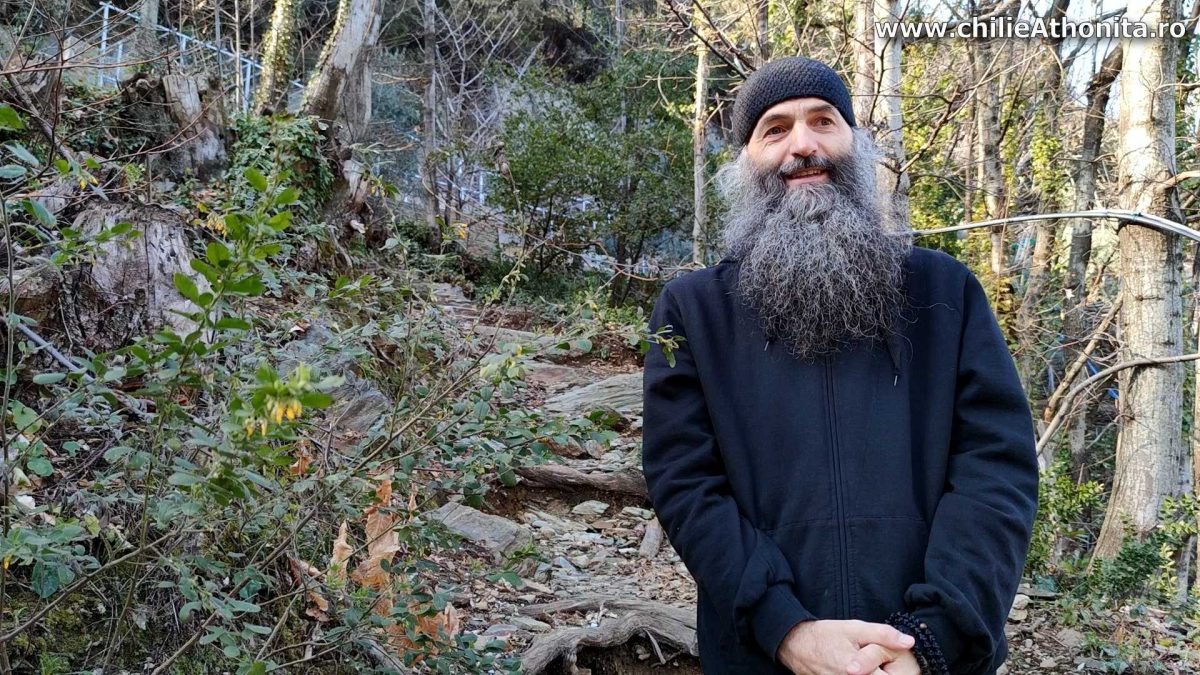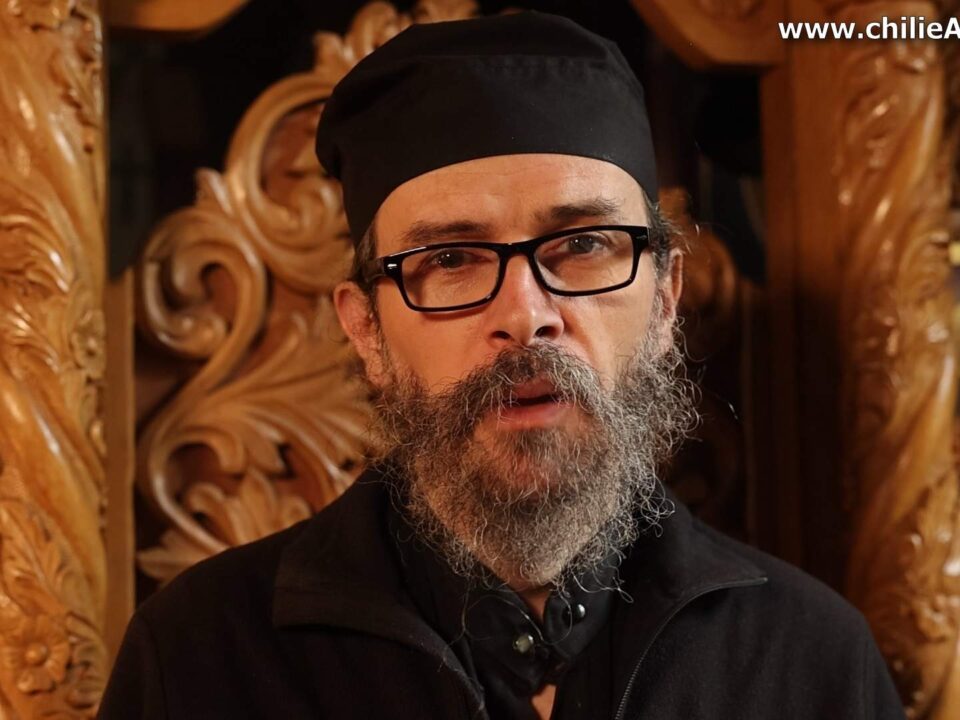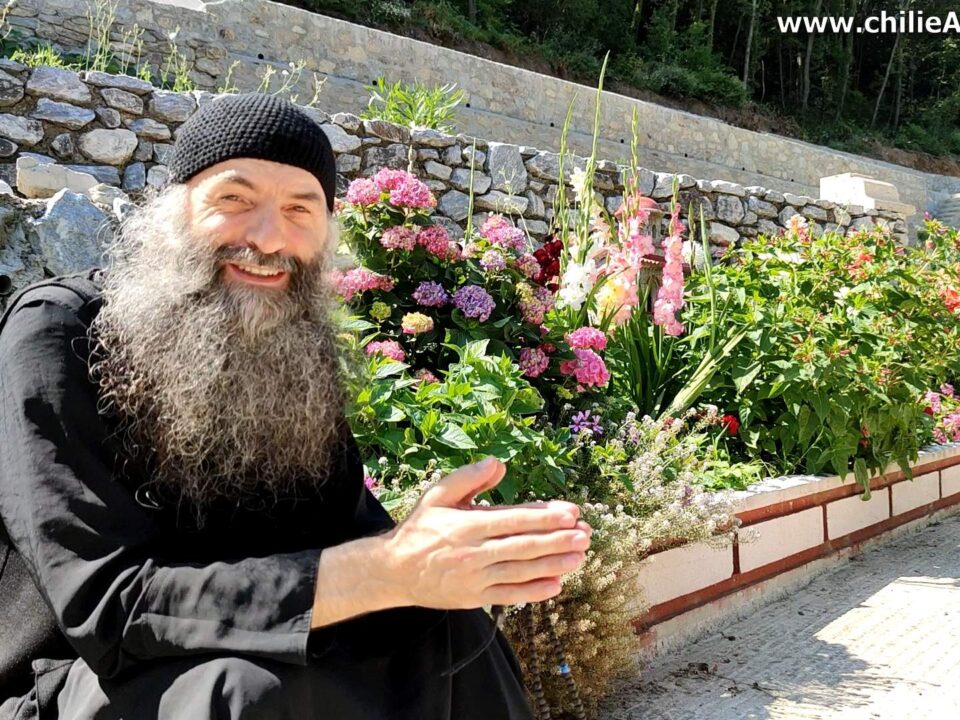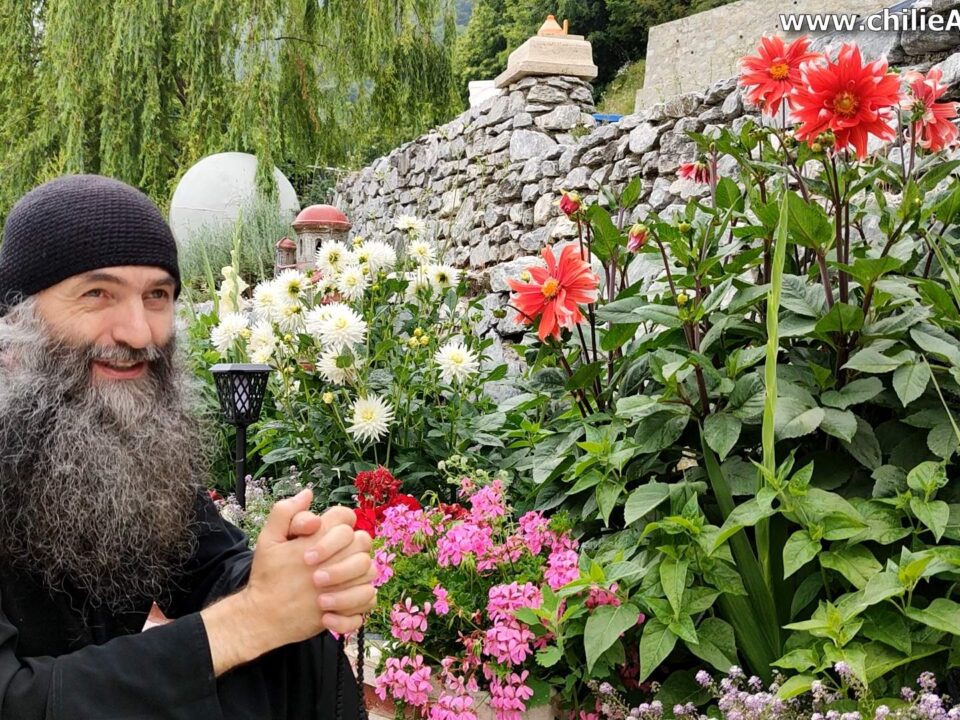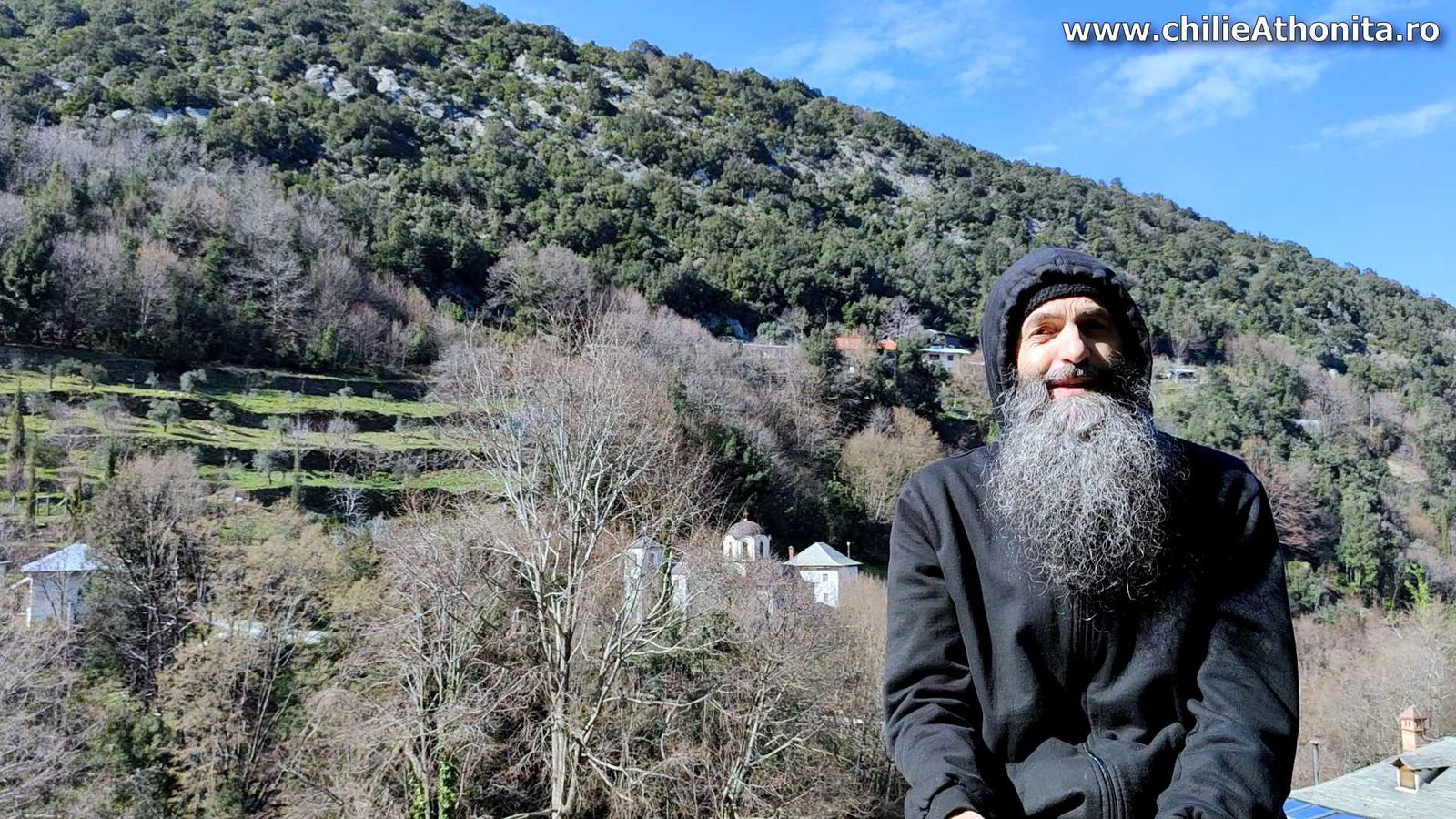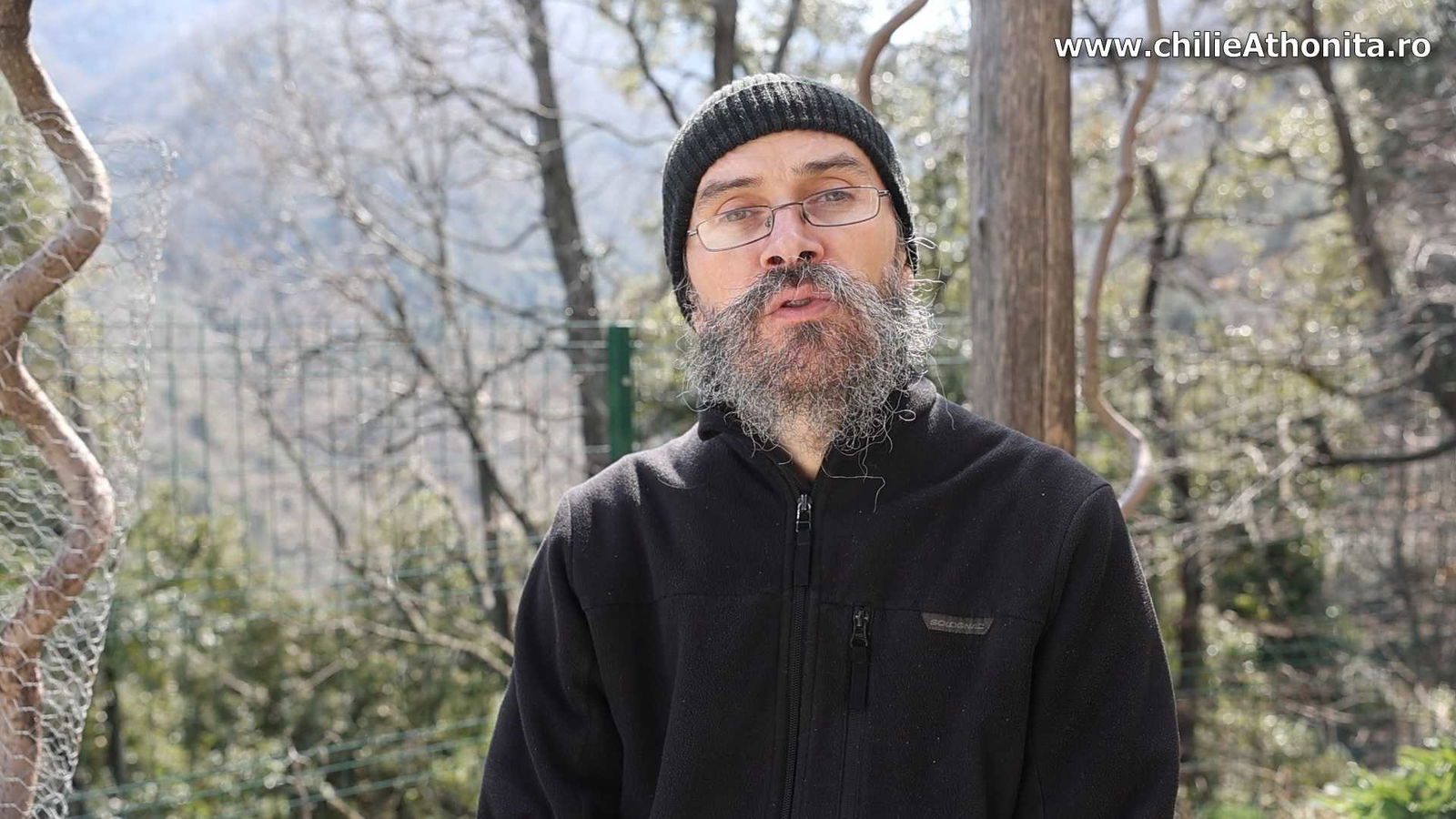What riches do monastics have? How do they handle themselves materially speaking? Watch this video and you will find out. As a bonus, father Pimen comments on a certain aspect of the war in Ukraine that is very good for you to know.
All this, adorned with images from the first cell that the father rebuilt from the ground up at Lacu Skete.
Enjoy!
When the people, on the day of Pascha, took up a white flag, crosses, and icons to cross into Romania, they waited for them and butchered all of them. They shot all of them.
Look dear ones, we are seeing each other again to continue what we started. I got a little tired, what did I want to tell you? You saw the recording that I did at the beginning in silence. Exactly from down there the path starts for the cell of the Holy Great Martyr Artemius, the first cell I made, which I built with the help of the saint and of the Mother of God. Now you saw how the path starts, because up to this cell, there is no road. There is only a path for a distance of about 200 meters. And you saw that the beginning is very steep. Now there are a few concrete steps, but at the beginning there was nothing, it was all forest around here.
That’s when we opened up the path for the first time, it starts right at the big church somewhere, and we will slowly continue up the path, and I will speak to you as I walk, with stops, slowly, as best I can. Because already we can hear a chainsaw, as the fathers are working down in the valley around the Skete, and it is harder to hear. That is why I will try to hike up on the path, and I will tell you about the cell of St. Artemius, how I started. I will start at the beginning so to speak.
Yes, so we shall continue. You see the path, here you can see the big church. We have started from the level of the church, but now we are a little higher up. On the path that you see now there are fruit trees, but before on the side of the path there was nothing, there was forest everywhere here. These have been planted later.
On the side of the valley you see the cells of our neighbors on the other side of the stream. That is why there is a bit more movement here, because this is the center area of the Skete. There is the big church which you saw of Holy Great Martyr Demetrius, that is why there are more cells in proximity to it. Yes…
And as you can see, here is the path that we take up to St. Artemius. This path did not exist at that time, as I told you, I left St. Paul’s and they gave me this cell. This was, I don’t remember, I think it was sometime at the beginning of ’97. It was exactly in January when the monastery approved the cell of St. Artemius, as I told you, and I came here, I cannot remember when…in January sometime, and I brought another Romanian father with me, who wanted to come at that time, to try to build it together. Of course the father who came did not stay long after we arrived. He stayed about a week and gave up, then he came back, a few times, but in the end he left, he didn’t stay.
And… This path – after I discovered that this path could be made – I started clearing it, started to clear the trees. You see it now dug out, but nothing existed before. I dug out what was possible, and in time, after materials and different animals – mules – were brought, and in the years until recently, it has been dug out even more. That is why you can see it looking like this.
So now to continue on. I came here, and do you know what I found at St. Artemius? Everything was a ruin. Broken, overgrown, the house was wrecked, where the church was – which existed there somewhat – and the roof, were full of holes, wrecked, and there was even a tree growing from the alter of the church.
So, after we reached this place, we said, “Let’s see what we can do to stay here.” It was winter, it was cold. And there was only a small room, made of cardboard, of plywood. So what did we do? We found a small metal stove, which we placed in that room. And we made a sort of bed out of a few planks of wood. And that’s where our first room was where I stayed with the father who would stay for awhile. So it was cold in the winter, snow, there was no window there, the small room was somehow under a cliff.
It was so cold and humid. And we would make the fire in that stove. The stove would get very hot so that we could heat the room. On the side facing the stove you would fry, and on the other side you would freeze. So you had to keep turning back and forth. Do not think that it was a large room. It was a small room. We could hardly fit in there.
I am taking a small break. I got tired. It’s hard climbing up. And as I told you… I will try to affix the phone because this seems like a pleasant spot to stop and chat a little bit. We are closer to the cell now. Yes and… Now you can even see me. So we started here.
At first of course we didn’t have anything. The fathers from St. Paul’s brought us here with a car, there was a very nice British father, father Evdochim, we got along well, and the father abbot allowed him to bring us here, to see the spot. Of course, afterwards we went back on the same day, so we could take some things. The treasurer from the monastery gave us a bag of rusks, a few cans of beans, some compote to have something to start off with, and we came here.
We made a fire, stayed as best we could and we started clearing up. We didn’t even know where to start. The brambles were as thick as my arm, they had grown through the walls, through everything in the house. There were dragons so to speak. You could find everything there.
In the beginning because of the state of the ruin, I said, “Well let’s leave it as it is.” And exactly in the front, when I get up there I will show you, there was a slight opening. So I said, “Let’s build something small here, 2-3 rooms, whatever we can, and we will see in the future.” Meaning it was quite difficult, not only in this regard, but we did not have anything. Do you know what it means to not have any money? To not know anybody? Because the whole Skete here was just started, there were about 3 cells which could support themselves, there was a new one being built over there, where a father had started from 0, and the other two that I told you about.
So there was nothing here in the Skete in the way of possibilities, and there would only be a person or so arriving from Romania once a week, or once every two weeks somehow, more by accident. That was about it. So there was nobody, there was no connection. All hope was with God.
So we started like that, clearing up, and when we would really freeze and couldn’t keep going and were hungry, we would go to the monastery. Because they allowed us to have our rooms at the monastery for that winter, so that when needed we would have somewhere to stay. We would go, spend some time there at the monastery, would fill up our bag, we would come here again. We would clear some more.
And that’s how spring came along. Then two of the fathers we got along with came from the monastery. They were Greeks from St. Paul’s, one of which was about our age, a little older, about 5 years older than me. He had been at the monastery for a few years, and they came and looked and said, “Father…” They saw that I had cleared the path somewhat, you could get up the hill, they arrived breathing heavily, hardly being able to get up here, they said, “Father, did you not find another place in which to kill yourself than here? Do you see what is here? There are so many cells that have a road close by, here there is no road, there is nothing, only cliff.” Up here you will see a large cliff and under the cliff there is a little space where the cell was. They said, “Look in any other place!” I said, “If this is where the Mother of God arranged, then this is the one I am building. I am not going back.”
So then one of the fathers said, “Father, I know you have nothing, only the clothes on your back, do you accept for me to help you with something?” I said, “In what way?” “I can call on 2-3 acquaintances of mine from Greece, I have a few friends, one of which even deals with materials and so on, to see what they could help you with.” I said, “I agree, but if possible without expectations on their part, I mean, if they help for God and that’s it. We pray for them, but cannot repay them with anything else.” “That is not a problem” he said. And so I agreed.
He called some of his acquaintances, and at one point, he succeeded somehow and someone paid for a load of gravel to be brought to me. Some gravel to start off with, if we carried it up. And afterwards we got some cement, to start something up. To be able to pour a little foundation, to do something!
Eh, so in this way, we got, down by the big church, where we started from, right there in front of the church, a load of gravel. It needed to be carried uphill. 200 meters on this path. I got a tin, like a bucket made of tin in in which you could put cheese, oil… I had found 2-3 tins at St. Paul’s, and I would put the gravel in it. You know that gravel is not light. Eh, I would fill it about half way with gravel, which would mean about 20kg. And I would put it on my shoulder, and go up the hill until the top. I made a bit of space, I would empty it there, and go downhill again. I would carry as much as I could carry, after a day like this of carrying from morning till night, I would have a little pile at the top. Because how else could it be when you could make maybe 30 trips in a day, continuously…but you couldn’t tell.
When going down I would look at the big pile, and then I would look at the pile at the top at night – how little it was. There would be other fathers visiting who knew me, “Alas, I would leave if I were you!” they said. Nobody would say, “May the Lord help you! Keep going, have courage!” All would say, “I would not stay here, to die here, to kill myself here, carrying things with a tin. Never!” They would all leave without encouraging me, they would all say that I came to kill myself here, they did not see anything else.
But I minded my own business, thinking, “The Mother of God willed this.” I always had the Mother of God in front of me. Even if it was the cell of St. Artemius, I would have the Mother of God before me, “Mother of God if this is where you sent me, then this is the one I am making. I do not know how, I have nothing,” but glory to God my body was able.
That doesn’t mean that I didn’t have some health problems like any person. My bones would hurt from the humidity that was here. But I would go on, and like that it began slowly, slowly.
After that, I was brought a load of cement. A load of cement pallets that needed to be brought up. A bag weighed 50kg. I would put the bag on my shoulder, and I would start climbing up. But because the path was as it was, I would not stop, if I stopped it was hard to get going again. I would put the bag on my shoulder and keep going in a rhythm until the top. Of course my legs would shake, but I would get to the top and put it down. I would make my way down, take up another.
I would make about 20 trips like this. I would be able to bring 20 bags of cement to the top in a day. So what would this mean? At 50kg each, 10 bags would be 500kg, 20 bags 1000kg, it means I would bring a ton of cement to the top. In this way, slowly, slowly… Of course at a certain point, I got wounds from the tin, I would place a wet towel there and keep going. That was the situation.
As I told you, there was also the other father, but when he would see how hard it was and what was happening, he would leave. After a week he would come again for 2 days, and then again he would leave. So I started it with the mercy of God. So it was done like that… and to pass over many things, because you know how it is… It was summer, hot, and somewhere about 100 meters from the cell into the forest, where there is a small house built now, I cleared some trees, about 3 meters squared in a circle, and an American brother from St. Paul’s, which I spoke to you about, who took care of Elder Neophytos, he had a tent since he had arrived from America. A tent that could fit even two people. And he gave me that tent.
So I put it in that place and I would sleep in it. That first year, until late fall, when the cold set in, I slept in that tent. I liked it because it was beautiful. Above the tent, I had a net, and I could put a tarp on top for the rain, I would tie it up from the four corners, and it would keep the rain out when it was necessary. Besides that, I would look at the sky. Until I fell asleep I would look at the stars, it was beautiful! Of course the animals would pass by, sometimes a wild pig, a fox, a jackal, but it was not a problem. They had gotten used to me there. So that’s where I would stay.
And I started slowly, slowly, as I told you. Afterwards, we were brought, by the same father, through his acquaintances, some wood planks, some beams, whatever was possible through the people he called on. And slowly, slowly things would arrive here without me having anything. Without money, without anything. There was no phone, I would only wake up to a car coming, and them saying, “Look, I have brought you these things.” “Great!” That was how the first phase started. After that I said, “I have all these things, I cannot leave the house uncleared.” That’s when I started to tear down all those walls, they were made from whatever the fathers had before in this place.
Because it was hard to carry things up, they built by placing a stone, a bit of dirt, a bit of wood, then again a stone…it was all mixed up. The walls were made from a combination of things: dirt, stone, wood, twigs, whatever they had to make the walls. That’s how things were done. Afterwards for the beams on top, they had cut some chestnut trees and placed them there. That’s how the old one was built. I cleared everything away.
And they had, under the church and a part of the cell, a bit of a celler. When we cleared everything up, it collapsed in there, and it was all ruin. So then we tried to strengthen the foundation that was there with a bit of concrete, on the margins so that it would be pretty strong, as it was built of stones. And at the end we poured a slab on top of it so that we could start the actual house on this slab. The foundation started at ground level, and where there was an incline it was about a meter and a bit high. So we poured the foundation and started, slowly, slowly.
And as I told you, what would I do? During the day I would work on all these things, but in the evening, when possible, by the light of a lamp, or when we were allowed to stay at St. Paul’s for a day or two, I would weave prayer ropes, and I had learned to weave crosses, which came about at that time and I would always be weaving these. I would combine physical work with weaving, as I could sell these to the monasteries, and we could earn some money. To buy food, to buy what was necessary, because I couldn’t just keep waiting. I would do everything I could.
In the meantime a few months went by, and my brother who is also a monk here, he was at a cell here with an older father who was living alone. He said, “I will come there too, will you take me?” I said, “Come, of course.” So that’s when he came too. Of course he was still living at the other place. He would paint, as he painted for a time too, he would paint an icon or two so that we could have some money.
I was also busying myself with the physical work needed. But at one point, as I kept working and carrying, because I was also pushing myself with weaving, carrying materials, pushing my arms too far, my left arm, from the elbow down, I could say was almost paralyzed. It was like a dead arm, I would lift it with my other hand. I could not make a fist, nothing. It was like this. And that’s when I became a little worried. I said, “Is this it, will I not be able to work with it anymore?” So that’s when I stopped the physical work for a period of two weeks. I would not use my left hand at all. I said, “Mother of God, as you know…” After about two weeks, my arm recovered. Slowly, slowly, my strength came back, and I could keep working. So I had pushed myself too far. I had worked a bit too much. That’s why my body could not cope. After that, slowly, slowly, I kept going.
In the meantime another two biological brothers of mine came from Romania, they managed to sort out the visa that was needed to come and help us too. And we started to build the cell. We had the brick brought to us in the same way, we carried it up the hill, and we started the walls. I was building on one side, they were building on another. I had learned to build because before going to the monastery, I had worked with a team for about half a year in construction, so I had an idea.
So we started. About half the house I built, half was built by them. And we succeeded until the fall, until the cold set in, to cover it and to even make a stove in each room. We built 3 rooms to start with and the church. A small church, you will see. That was for the beginning to have somewhere to stay. And right when the cold set in, when we couldn’t stay outside, that’s when we managed to make a fire in the stoves, to dry everything out, the stoves and then the rooms, because being freshly built, they needed to dry. And in this way we made it so that we could move into the rooms. That was the first phase.
There are many things to say, I have told you everything in short, of the first year. We can say that it was a pretty exhausting year. Lots of work, but it was done with hope in the Mother of God. In this way, we managed what was done.
Now we will continue a little bit, I will tell you a few more things, but let’s reach the gate at least. Because afterwards we will continue, in the next recording, with what is happening with the cell, what the situation is, how we lived in the first years. You will see.
I am trying to go slowly, because the phone is on a tripod, and I am trying to not get it stuck on something. You can see now the path has steps. At that time it did not. This was done now, in time, since the water broke through here, and it was done so that it would be possible to go up easier. There… And of course things have improved here, you will see, the entrance… It was not all like this, these were done in time, slowly.
Look, this is what it is like here. The stone-paved path is here. This path is made of stones pounded into the ground. This was the old pathway that would cross by the upper part of the Skete, and it would go to Provata, towards Karyes. And it was made in this way so that the water could not break through. Because before mules were used for traveling too. That is why it is done in this way. The path was here, and it would go down into the valley, to the big church. This was the old pathway which in time was broken off, it goes to a certain point and then it is no more. That is why I could not find it and I opened up this other one here.
Here you can see the garden, and the cell of St. Artemius there. Well everything you see here with the garden, the walls, in the valley, did not exist at that time. Actually they existed but they could not be seen. The brambles had grown so large, that we did not know what was in the valley. It was thick, everything on top of each other, so we started to slowly clear it out to see what was in the valley. We discovered olive trees which were almost dry, what you see now grew afterwards. They were all completely covered, we could not see them, and we kept clearing until we discovered what was around the cell.
And now we will go to the gate. Now they have put a gate here, before it did not exist, or these walls. Let me see if we have access as they have closed things off here. There, I managed to open it. Now my brother is at this cell. He has another 5 with him, 4 brothers and a father who live here.
And you can see that now they have made the entrance out of concrete. It did not exist before, neither did the wall on the left. When I left there was nothing. You see up here on the left is all cliff. That is how the cliff is all above the cell. And… Here is a cross that was placed at the entrance. As you can see they added all these, in time, to the entrance of the cell.
And… We will go on a little further and then we will stop. What I told you about until now will be the first phase. Now I will try to tell you a few more things before ending, because I do not want to go overtime, to always speak to you for about the same amount of time.
So this was sort of the beginning. Afterwards we will get into…the bigger interventions of the Mother of God, not that she didn’t intervene until now, everything you see, I came here from 0 and the Mother of God took care of everything for us to be able to do it.
But there were many miracles here. Lot’s of them, and next time I will try to relate some of them, how the Mother of God worked and how she continuously helped us here. Yes, dear ones.
You saw that we walked the path together until here. On this path I carried the house on my back so to speak. This was the beginning here. Everything on the back. Afterwards I will describe how we managed to have two mules, borrowed from somewhere, and we used them in time. That’s the second phase. Because we kept having to add and work here.
Yes, dear ones. Other than that, what else can I tell you before ending… I do not want to go into what is happening in the world, but sometimes it is good to know a little bit of the history. Because I was reading somewhere, I don’t remember where, it was otherwise Iorga or someone else who said, “A nation which does not know its history risks repeating it.” Meaning the mistakes it made in history through time.
And actually because Putna Monastery is dear to me, and there is a choir nearby, from Bucovina, from Vicovul de Sus called, “Ai lui Ștefan, Noi, Oșteni” [“We, Stephan’s Soldiers”], I would listen to some of their songs, because these young people are dear to me. I even met them. And I heard one of their songs, in memory of the Fântâna Albă massacre. And I didn’t know anything about it, so I thought I should look into it to see what it was about. Yes, and I can say that it hurt me, I was horrified at what happened there.
So where is Fântâna Albă? It is a few kilometers from our border, in North Bucovina, so in Ukraine, where the war is now. This happened in about 1941. So when the communists were in power, during the time of the Soviet Union, but there were the republics, like the Republic of Ukraine and so on. So that’s where it happened, and we can say that the soldiers were natives of the place, Ukrainians which controlled the area.
And so that I do not go into details, search it up, you can find it on Google, what happened at the Massacre of Fântâna Albă. How around 3000 innocent people were shot, the Romanians from North Bucovina. They were lured into a trap, because they were told that they were free to cross into Romania, only under pretext to find out who did not agree with them. And when the people, on the day of Pascha, took a white flag, crosses, icons, to cross into Romania, they waited for them and they butchered all of them. They shot all of them, and after they ran after them in the woods shooting all of them, not forgiving anybody, so to speak, they were put into mass graves…
I am not saying this as a cry against Ukraine, but with pain for what our poor Romanians had to endure in North Bucovina. Do you understand? And I want to get somewhere with this… Of course, we know that even more recently, the current leadership, banned Romanian language, even banned teaching it in schools, meaning the people there have had a hard time. But I have appreciated something in our Romanians. Despite these things, despite what they have gone through, you see now when the refugees came, most of which are Romanians, but also Ukrainians too, you see the love that they were received with by Romanians. They did not take anything into account. Regardless of what happened there, how they treated the Romanians in their time…
I even saw recently at the monastery the previous Sunday, I think at Bârsana Monastery, that even the service was done half in Ukrainian, just for the Ukrainians who were there because the Romanians from Northern Bucovina know Romanian, so it was said in Ukrainian so that the Ukrainians could also understand. To bring them joy somehow.
Because simple people are not guilty, regardless of whether they are Romanian, Ukrainian or wherever. Simple people, no! The great interests lie elsewhere. I’ve been looking, and discussed this, and we also know families, the majority who came are only the women and the children. I said, “Where are the men?” They said, “They wanted to come, but at the border in Ukraine, they were stopped and turned back, we got in touch with them and they said their IDs were taken away, they were given a weapon and put forward to fight.” We could say that they are cannon fodder.
Poor them…Romanians, Ukrainians, poor them! So they are used like this, while many people told me, and you all are aware of this, that at the border there were hundreds of cars, passing through the diplomatic corps line, without getting checked, luxurious cars, all with young men at the wheel. They were leaving Ukraine, getting away from the war. So they were not stopped by anyone to fight in Ukraine. They were allowed to leave freely. Who are they? The rich. And the simple people are put forth as cannon fodder to die.
We know that as usual the interests are great. I will not get into the politics, but it hurts me when I see that simple people are being used, it is them that are innocently dying again, for the interests of the bigshots. Yes, dear ones, I said this as a parenthesis, because everything that is happening hurts me.
I am not on the side of anyone. Not on the side of the Russians, not on the side of the Ukrainians, no! I am praying for everyone. But if I am to be on the side of anyone, I am on the side of Romanians. And this is not a mistake.
Looking at St. Paisios of Mount Athos, who is a saint, when he was praying, he was praying for the peace of the whole world, for everybody. But at the end of his prayer, you know what he would say? “Lord please take care of everyone, protect them to be in peace, but my Greece, please take it in your arms, and keep it at your heart.” Meaning, take care of it more than all the rest. He was a saint, and if he was saying this, in the same way I can say it about Romania, when I pray to the Mother of God, to have it under her protection and care.
I hurt for Romanians. And that is why I have always recommended that Romanians not enter the war. It is not our war. We help everyone who reaches Romania with love, we feed them and everything, but let’s not get into a war that is not ours and which only brings death. Let’s have love, peace, pray for everyone, let’s help everyone, and let’s ask the Mother of God to have us in her care and under her protection always. God help us!
Online commemoration lists and donations
May the Lord help us!
Online Commemoration Lists and Donations
May the Lord help us!
If you have a bank card and wish to send commemoration lists and donations online using your card, and/or to support our philanthropic activity, including this site, please fill out the form below to make a small donation. The form is secure – we use Stripe for payment processing – a world leader in this field. We do not collect your personal data.
If you do not have a card, or do not wish to use it, visit the webpage for Online Donations and Commemoration Lists.
We will pray for your loved ones! (Please do not include inessential details like wishes, degree of kinship, introductions etc. JUST the name!)
Especially for recurring commemoration lists, we ask that you please keep them to under 20 names long. If you include a member of the family, we add “and for their families.”

Pomelnice online și donații
Doamne ajută!
Dacă aveți un card și doriți să trimiteți pomelnice online și donații folosind cardul dumneavoastră, sau/și să susțineți activitatea noastră filantropică, inclusiv acest site, vă rugăm să introduceți datele necesare mai jos pentru a face o mică donație. Forma este sigură – procesatorul de carduri este Stripe – leader mondial în acest domeniu. Nu colectăm datele dvs. personale.
Dacă nu aveți card sau nu doriți să-l folosiți, accesați Pagina de donații și Pomelnice online .
Ne rugăm pentru cei dragi ai dumneavoastră! (vă rugăm nu introduceți detalii neesențiale precum dorințe, grade de rudenie, introduceri etc. Treceți DOAR numele!)
Mai ales pentru pomelnicele recurente, vă rugăm să păstrați pomelnicele sub 20 de nume. Dacă puneți un membru al familiei, noi adăugăm „și familiile lor”.
Dumnezeu să vă răsplătească dragostea!


